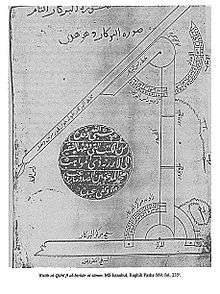Al-Samawal al-Maghribi
| Samauʼal Al-Maghribī | |
|---|---|
| Born |
c. 1130 Baghdad, Iraq |
| Died |
c. 1180 Maragha, Iran |
| Residence | Baghdad |
| Academic background | |
| Influences | Abu'l-Barakat |
| Academic work | |
| Era | Islamic Golden Age |
| Main interests | Mathematics, Medicine |
Al-Samawʾal ibn Yaḥyā al-Maghribī (Arabic: السموأل بن يحيى المغربي; c. 1130 – c. 1180), commonly known as Samau'al al-Maghribi, was a Muslim mathematician, astronomer and physician.[1] Though born to a Jewish family, he concealed his conversion to Islam for many years in fear of offending his father, then openly embraced Islam in 1163 after he had a dream telling him to do so.[2] His father was a Rabbi from Morocco.[3]
Mathematics
Al-Samaw'al wrote the mathematical treatise al-Bahir fi'l-jabr, meaning "The brilliant in algebra", at the age of nineteen.
He also used the two basic concepts of mathematical induction, though without stating them explicitly. He used this to extend results for the binomial theorem up to n=12 and Pascal's triangle previously given by al-Karaji.[4]
Polemics
| Arabic Wikisource has original text related to this article: |
He also wrote a famous polemic book in Arabic debating Judaism known as Ifḥām al-Yahūd (Confutation of the Jews) or in Spanish Epistola Samuelis Maroccani and later known in English as The blessed Jew of Morocco.[5][6]
Notes
- ↑ Jewish Encyclopedia
- ↑
- ↑ Medieval Cultures in Contact, By Richard Gyug, pg. 123
- ↑ Katz (1992), p. 242:
"Like the proofs of al-Karaji and ibn al-Haytham, al-Samaw'al's argument contains the two basic components of an inductive proof. He begins with a value for which the result is known, here n = 2, and then uses the result for a given integer to derive the result for the next. Since al-Samaw'al did not have any way of stating the general binomial theorem, however, he cannot be said to have proved it, by induction or otherwise. What he had done was provide a method acceptable to his readers for expanding binomials up to the twelfth power..."
- ↑ Samau'al al-Maghribi Ifham Al-Yahud: Silencing the Jews / placeholder for Arabic language transliteration, by Moshe Perlmann
- ↑ Samau'al al-Maghribi: Ifham Al-Yahud: Silencing the Jews / placeholder for Arabic language transliteration by Moshe Perlmann, Proceedings of the American Academy for Jewish Research, Vol. 32, Samau'al Al-Maghribi Ifham Al-Yahud: Silencing the Jews (1964)
References
- Anbouba, Adel (1970). "Al-Samaw'al, Ibn Yaḥyā Al-Maghribī". Dictionary of Scientific Biography. New York: Charles Scribner's Sons. ISBN 0-684-10114-9.
- O'Connor, John J.; Robertson, Edmund F., "Ibn Yahya al-Maghribi Al-Samawal", MacTutor History of Mathematics archive, University of St Andrews.
- Samau'al al-Maghribi: Ifham Al-Yahud: Silencing the Jews / placeholder for Arabic language transliteration by Moshe Perlmann, Proceedings of the American Academy for Jewish Research, Vol. 32, Samau'al Al-Maghribi Ifham Al-Yahud: Silencing the Jews (1964)
- Samaw'al al-Maghribi: Ifham al-yahud, The early recension, by مغربي، السموءل بن يحي، d. ca. 1174. al-Samawʼal ibn Yaḥyá Maghribī; Ibrahim Marazka; Reza Pourjavady; Sabine Schmidtke Publisher: Wiesbaden : Harrassowitz, 2006.OCLC: 63514265
- Perlmann, Moshe, "Eleventh-Century Andalusian Authors on the Jews of Granada" Proceedings of the American Academy for Jewish Research 18 (1948–49):269-90.
External links
- Al-Bahir en Algebre d'As-Samaw'al translation by Salah Ahmad, Roshdi Rashed, Author(s) of Review: David A. King, Isis, Vol. 67, No. 2 (Jun., 1976), pp. 307-308
- Al-Asturlabi and as-Samaw'al on Scientific Progress, Osiris, Vol. 9, 1950 (1950), by Franz Rosenthal, pp. 555-566
- Arab Mathematics
- Naderi, Negar (2007). "Samawʾal: Abū Naṣr Samawʾal ibn Yaḥyā ibn 'Abbās al‐Maghribī al‐Andalusī". In Thomas Hockey; et al. The Biographical Encyclopedia of Astronomers. New York: Springer. p. 1009. ISBN 978-0-387-31022-0. (PDF version)
